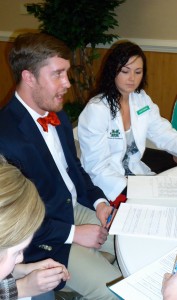Dr. Penny Kroll and Dr. Rania Karim of the Marshall University School of Physical Therapy have received the Hedrick Program Grant for Teaching Innovation for the 2013-14 academic year.
Kroll is director of the School of Physical Therapy and Karim is an assistant professor with the school.
The Hedrick Grant is given annually from the Faculty Development Office in the Center for Teaching and Learning at Marshall. The grant funds an award of up to $5,000 for a project that supports innovations in teaching at the program level.
“As clinicians we realize the importance of working together across disciplines,” Kroll said. “We have joined with the College of Health Profession’s Department of Communication Disorders and School of Nursing as well as the Joan C. Edwards School of Medicine and School of Pharmacy to continue our inter-professional education (IPE) initiative.”
Approximately 320 students were brought together this past spring for three, three-hour seminars. They participated in activities designed to encourage inter-professional education, which occurs when “students from two or more professions learn about, from and with each other to enable effective learning.”
With the aid of the Hedrick Grant, Karim said students can build on these experiences and continue their interactions with different professionals to learn about improving patient care.
“If we can get our students exposed to this collaborative environment of working with individuals of different disciplines, we create meaningful interactions that improve student outcomes,” Karim said. “Growing up in this educational environment will allow them to be more prepared for real-world situations. That’s our ultimate goal.”
Both Kroll and Karim agree the need for inter-professional education is greater than ever due to miscommunication among health care workers, which can result in many costly medical errors. Pam Holland, director of clinical education in the Department of Communication Disorders, said the changing landscape of health care is one reason why inter-professional education is so important.
“Students we are educating now will be working in a changing environment,” Holland said. “It is essential, now more than ever, to have a solid understanding of how other professionals can contribute to the care of a patient and see others’ knowledge and skills as equally important.”
Holland, one of the faculty organizers for the inter-professional education sessions, said she was not surprised to hear about the School of Physical Therapy’s grant award.
“This is a great example of innovation that benefits both faculty and students as well as the community for years to come through the quality of health care received,” Holland said. “The fact that the IPE initiative is a collaborative endeavor across several disciplines further supports the recognition provided through the grant.”









